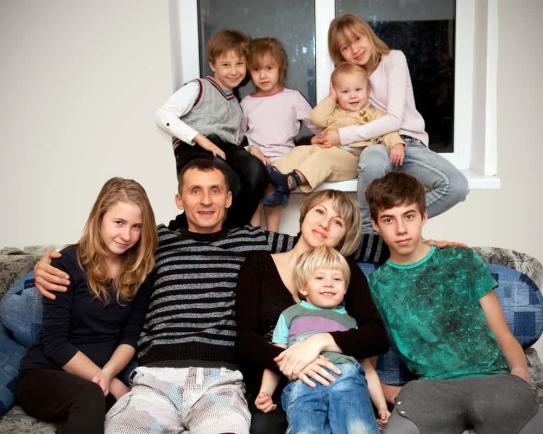
Strolling around New York City with a pack of nine people wearing matching yellow T-shirts may not be something I enjoy reflecting on. But as the youngest of seven, I have many fond memories of growing up in a large family. With birthrates at a record low, many are missing these advantages. Here is a list of some of the positive aspects of growing up in a big family.
1. Learn to share and compromise
A 2004 study of more than 20,000 kindergarteners in America found that teachers rated students who had at least one sibling as having an edge in social skills. They were better at making friends, helping other kids and more in tune to the feelings of others. Compromise and cooperation are just some of the positive results kids can benefit from having multiple siblings. These abilities help children build more positive relationships with one another.
2. Lonely buster
Many parents find that children with multiple siblings tend to get along better and love each other at an earlier age. According to BabyCenter, having more than one sibling increases a child's ability to make friends, show empathy and accept responsibility since there is always someone to play with.
Friends and neighbors may come and go, but siblings are there for life!
3. Bigger vocabulary
An advantage of being one of the youngest in a large family is having a bigger vocabulary. When you spend all your time around older siblings, you tend to use bigger words. However, you may not necessarily know what they mean.
4. Love multiplies for children
When a friend of mine was expecting her second child, she shared with me some worries of not loving him as much as her first child. I assured her that as you have multiple children, the love does just that: multiplies! It's a wonderful feeling to see how much the love you thought was already about to burst, can continue to grow with each new member of the family.
5. Love deepens for husband
I remember the exact moment when I looked at my husband right after I gave birth to our first child. I was physically drained, yes. But what I remember most was how I literally felt my love for him grow at that moment. And it only intensified with each child. Children are quite observant to the loving relationship their parents have, even when no words are spoken. This makes for a healthier family relationship which reflects on the personality and actions of children.
6. Housework help
With a bigger brood often comes a bigger house. No need to fork out extra dough for a cleaning service! Get those kids to work! Chores, especially when organized, teach children responsibility.
7. Names, Names, Names
Remember when you were young, and you would envision your future family and pick out names for each child? With a big family comes a need for a variety of names! Something fun (and maybe a little scary) you could do to involve the older children is to let them pick out the name of the new baby! But proceed with caution: if I had let mine do that, my youngest would be named Spinosaurus.
8. "Team" work
I have many fond memories of playing kick-ball with my siblings. Often, our parents would join in on the fun and we would have two full-sized teams in our backyard. This gives children great opportunities to practice good sportsmanship.
9. Self-reliance
According to educational consultant, James B. Stenson, children from big families are genuinely needed at home. Through their chores and their handling of responsibilities around the house, they contribute to the family's welfare. They grow in self-knowledge, self-confidence and self-reliance.
10. Grow to be givers
Children from big families understand the real meaning of responsibility, as mentioned above. They learn that if they don't do their duty, someone else will suffer. Consequently, their moral development moves from "self" to "others," taking root more deeply. They grow to be givers, not takers.
These are only some of the benefits of growing up in a big family. These life lessons can be learned more naturally and help to create our character. Our families are what make us who we are today.

